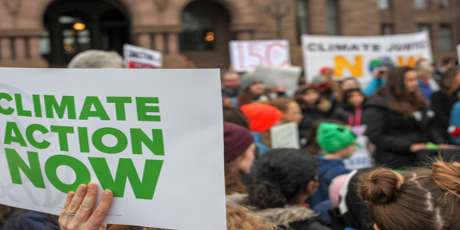Why haven't actions to tackle climate change worked to date? 17 Feb 2020

- Dr Alexandra Revez, ERI, Cleaner Production Promotion Unit, School of Society, Politics and Ethics
Opinion: the challenges of climate transformation seem as daunting today as they were 20 years ago
When it comes to tackling climate change, are we heading towards the prospect of a failed experiment? Despite a series of conferences and negotiations such as the United Nations conference on Environment and Development in Rio de Janeiro in 1992 and in Kyoto in 1997, there has been considerable resistance and disagreement on the part of most countries on how to address this global environmental problem.
Although there is robust scientific evidence regularly stressing the damaging impacts of climate change, it has been difficult to reach agreement over the causes and best course of action with regard this global issue. Hailed as a breakthrough in international climate policy, the Paris Agreement was significantly weakened by the withdrawal of leading industrialised economies such as the United States in 2017. Recent presidential elections in Brazil, another large economy now under a far-right leadership who pledged to follow the US actions on climate, also suggests flailing commitment to the Paris Agreement.
Although these political setbacks are problematic, the reality is that even those countries that remain committed to these international climate change agreements have demonstrated poor policy performance, implementation and lack of commitment to change.
In climate change and sustainability discussions, the term "transition" is often used to refer to drastic societal changes leading to significant environmental, social and economic transformations. In practical terms, the call for transition amplifies the need to implement new systems of energy production, consumption and growth. While many political leaders across the globe have expressed the need to move towards transition for a number of years, this has regrettably not led to any considerable transformation.
Even with significant attempts globally to shift society away from harmful fossil fuels, to introduce cleaner technologies and to establish more sustainable consumption practices, there has been no robust change to existing societal systems. We remain largely dependent on fossil fuels and we continue to rely heavily on growth models which undermine the ecological stability of our planet.
The challenges of having a definite pathway towards climate transformation seem as daunting today as they appeared 20 years ago. Consequently, it can be argued that we find ourselves in a state of "permanent transition". A political science term to describe unfinished and prolonged democratisation processes in the developing world, "permanent transition" seems a fitting concept to describe a process of transition mired by seemingly immovable obstacles and prolonged through eloquent yet unfulfilled promises. Technological innovations, international agreements and national based climate change strategies are examples of promising attempts to secure a definite move away from fossil dependency which, despite promising signs for a sustainable future, remains beyond our grasp.
Because climate change is such a complex issue with links and implications that cross political boundaries, it is increasingly difficult to pinpoint what has gone wrong. Over-reliance on technology to lead the way towards transformation has not proved to be the desired straightforward solution to the climate crisis. Equally, advances in economic systems, such as circular economy innovations (which seek to minimise waste and improve efficiencies in resource use), while encouraging cannot be at present labelled as game-changers in the quest for transformation.
From a political point of view, the challenges are similar. The environment is now firmly a public policy issue and there has been a growth in the number of organisations and institutions with an environmental or climate change brief. Yet policy paths to transition have been weakened through lack of political leadership and a consistent diminishment of climate change priorities.
The coming of age of climate action is not marked by maturity but by ingrained complacency. Furthermore, there are cumulative harms in lingering in a state of permanent transition. Beyond the well-established scientific projections that shortfalls in limiting global warming to 1.5 ℃ will have escalating consequences, continued delays and failure to consolidate a definite path to transition also has escalating impacts at a societal level.
When messages of change become familiar but fail to consolidate, we are faced with a situation where message inspire suspicion rather than sparking enthusiasm. Prolonging the arrival of climate change transitions may continue to perpetuate the status-quo through stop-and starts and hidden agendas, which continuously undermine the definite shift away from current fossil fuel based regimes.
Greater citizen engagement and participation is increasingly needed to raise awareness, foster dialogue and mobilise communities to action. In Ireland, projects such as Imagining2050 seek to set into practice these ideas by developing and testing new schemes for greater collective commitment to climate change action. Such processes focus on inclusion, equality and reasoned argument as a means to reach consensus and commitment to action. This type of approach offers the opportunity to develop a counter-culture based on dialogue, social solidarity, practical lived knowledge and the imperative of understanding that climate change affects us all.
Recent waves of protest led by young people across the globe calling for climate action demonstrate the impact and value of grassroots mobilisation. To promote and consolidate a significant transition towards environmental sustainability, this is perhaps the key factor in extricating ourselves away from a misplaced reliance on technology, the market or macro-politics to provide a solution for climate change.